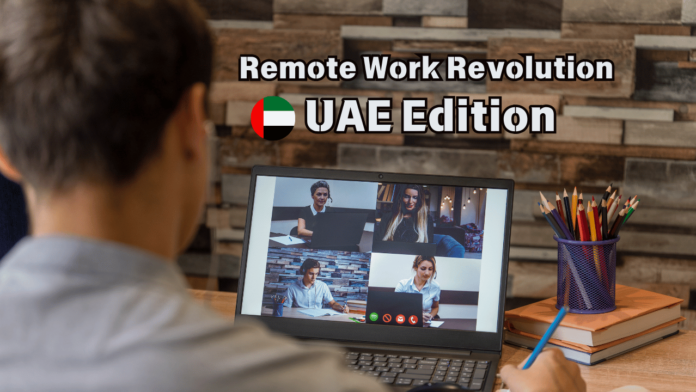Today’s world views remote work as not a trend but a permanent feature that has changed the way we used to work and live. This shift in work culture towards remote work in the United Arab Emirates is induced by both compulsion and innovation. The UAE government has played an important role in facilitating this change by creating a policy environment that embraces a flexible work environment. But how precisely is remote work continuing to evolve in the UAE?
Government Initiatives Support Remote Work

The UAE government was not behind in taking initiatives over remote work. Initiatives such as the National Program for Remote Work, which has been introduced as early as 2020, aimed at creating a sustainable and flexible environment of work. The UAE is leading by example on the global stage when it comes to innovative approaches and openness to reshape conventional paradigms of work. To learn more about UAE’s remote work system, visit GlobalJobUpdates.
The UAE Remote Working Visa Advantage

Among the policies introduced that stand out is the Virtual Visa. This program will allow foreign professionals to live in the UAE and work remotely from anywhere other than UAE companies.
What’s in it for them?
First, it makes the UAE a hot destination for expatriates who want to live in a cosmopolitan city like Dubai or Abu Dhabi but want to continue working with whomever it is they work for. Its not just a visa, its an opportunity to connect globally while enjoying the rich lifestyle that the UAE has to offer.
Flexible Work Policies
Flexibility is at the core of many modern policies in the UAE, concerning different business fields. Immediately after introducing flexible working hours and remote work, it became possible to notice a visible increase in employee productivity. Flexibility is not about working from home; it is the freedom of choice as to where and how to work more efficiently. Learn about new flexible work policies and how to get a work remote visa in Dubai at GlobalJobsUpdate/Blog.
Impact on Work Culture and Employee Well-being

The transition to work-from-home has transformed workplace culture in the UAE. Working from home is more than a change of location; it reflects changing attitudes in the way businesses approach employee well-being and productivity.
Increasing Employee Engagement
As more businesses start to work remotely, innovative ways of keeping them involved and stuck as a team are being brought into play. Virtual team meetings, digital hangouts, and online collaboration tools ensure workers stay connected and engaged. The emphasis has now shifted on building a sense of community even when the employees are miles apart.
Read here about effective strategies that would help maintain employee engagement, our blog link
Challenges Experienced by Virtual Workers
However, despite the many benefits, remote workers also deal with challenges of isolation and balancing work-life demands. Such concerns are very crucial for maintaining high levels of productivity and morale. Companies find active solutions through encouraging regular check-ins and leveraging digital communication tools for creating support networks.
Find remote work challenge solutions here 10 Secrets Cracking the UAE Job Market in 2024
Technological Advances Driving Remote Work

In addition, technology is the backbone behind this whole work-from-home revolution, and it makes communication and collaboration quite easy, no matter how big the gap between people.
Development of Digital Infrastructure
The country has invested heavily in its digital infrastructure to ease the transition of people to remote work. From high-speed internet to cybersecurity and advanced IT systems, technology supports this shift in many ways. This is not a mere investment to increase work efficiency but also makes UAE a modern destination to attract professionals from around the world. Continue learning about the UAE’s development in digital infrastructure here.
What kind of technology has made remote control possible?
A number of digital tools are reforming how teams collaborate across locations. Starting from the widely used software, including Microsoft Teams, Slack, Zoom, and Asana, the modern virtual space is incomplete without them. These offer flexible channels of communication, features of project management, and environments for collaboration imperative to sustain productivity and teamwork.
Future of Remote Work in the UAE
The remote work landscape of the UAE keeps evolving. What’s next?
Trends to Watch
Hybrid workplaces, increasing freelance opportunities, and changing regulations-these are just a few of the emerging trends that will continue to revolutionize the way one works remotely. One can quite be assured that this itself will make UAE see a more diverse workforce, as more and more expatriates take advantage of remote visas and flexible work policies. Keep pace with these emerging workplace trends at Jobs in Dubai.
Long-term Sustainability of Remote Work
Going forward, remote working will be pegged on wheels of sustained change and innovation beyond the pandemic era. Both employers and employees have to continue with sustained agility through technology and flexible work arrangements that offer competitiveness in a remote-first environment. Explore how remote work will unfold in the future at Jobs in Abu Dhabi.
Conclusion
This is not a shift but a transformation of traditional workplace norms in the UAE. From government initiatives like Virtual Visa to advancement in digital infrastructure, the UAE is the trendsetter for a flexible and innovative work culture. As the trends will further evolve, the balance between embracing new opportunities and responding to challenges would define the sustainable future of remote work in the region.
The remote work journey is here to stay, and the UAE’s determination toward creating an enabling environment for local and international talent alike makes it the frontrunner in this global evolution.

